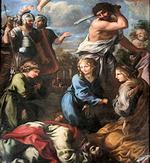Make your gift today!
Help keep Catholics around the world educated and informed.
Already donated? Log in to stop seeing these donation pop-ups.
USCCB committee: statement on 50th anniversary of Vatican II’s liturgy constitution
September 26, 2013
The United States Conference of Catholic Bishops’ Committee on Divine Worship has issued “Stewards of the Tradition,” a statement on the fiftieth anniversary of Sacrosanctum Concilium, the Second Vatican Council’s Constitution on the Sacred Liturgy.
The committee, chaired by Archbishop Gregory Aymond of New Orleans, expressed gratitude for to “all who are involved in liturgical ministry and liturgical leadership in the United States. Without your continued cooperation and self-sacrificing ministry, the implementation of the reformed liturgical rites after Vatican II, which have proven to be such a grace for the Church, could never have been undertaken.”
“Grateful for the catechetical work the Church in the English-speaking world has successfully undertaken for the implementation of the Roman Missal, Third Edition, we also wish to offer words of encouragement for the ongoing work of implementation and liturgical catechesis that lies ahead, especially as the Church calls for the reverent and proper celebration of the Sacred Liturgy as an intrinsic part of the New Evangelization,” the committee continued.
Citing documents of St. Pius X and Venerable Pius XII, the committee stated “the Constitution on the Sacred Liturgy was the fruit of the evolution of the Church's teaching on the Liturgy, especially from the early years of the last century … We believe that the Constitution on the Sacred Liturgy should be understood as a ‘keystone,’ with both a history leading to it and other developments flowing from it.”
Turning to the liturgical translation, music, and “liturgical song,” the committee added:
Translation of liturgical texts into vernacular languages, for example, has been a monumental success, making the words of the Liturgy more understandable to those present. We should continue to consider ways in which the Liturgy can be legitimately adapted to the various cultures of our people. We also recognize that the Liturgy has a culture all its own which can have a great influence for good upon society, and each of us must be open to the power of the Liturgy to shape and form our hearts and our lives to be more like Jesus Christ …
The setting for the celebration of the Liturgy should be beautiful. While notions of what is "beautiful" can be subjective and culturally rooted, we wish to underscore that the objective quality of beauty is a reflection of the Divine …
The development of a repertory of vernacular music for the Liturgy over the past fifty years is a gift for which we are grateful and which we continue to promote. We also seek to improve the quality of our celebrations in light of the USCCB 2007 guidelines Sing to the Lord: Music in Divine Worship. To rely only on the music of a single genre or style for the celebration of the Liturgy is to diminish the breadth and depth of our liturgical heritage and to risk the exclusion of the legitimate contributions of particular cultures and composers.
For all current news, visit our News home page.
Further information:
- Stewards Of The Tradition - Fifty Years After Sacrosanctum Concilium (USCCB)
- Constitution on the Sacred Liturgy
All comments are moderated. To lighten our editing burden, only current donors are allowed to Sound Off. If you are a current donor, log in to see the comment form; otherwise please support our work, and Sound Off!
-
Posted by: ElizabethD -
Sep. 27, 2013 11:43 AM ET USA
I went and looked to see for myself that it does not even mention the Council's teaching that Gregorian Chant is to have pride of place. It is really pretty perverse to speak of music, even of "liturgical song" having a "preeminent place" and not speak of the Gregorian Chant which is proper to our Latin Rite. I am a member of a Gregorian Schola for the old Mass, and I also attend a Novus Ordo Mass on Sundays where I am always sad at heart that the Chant proper to the liturgy is hardly ever used. I am 35, many people of my generation have not even been familiarized with the Church's heritage of sacred music.







